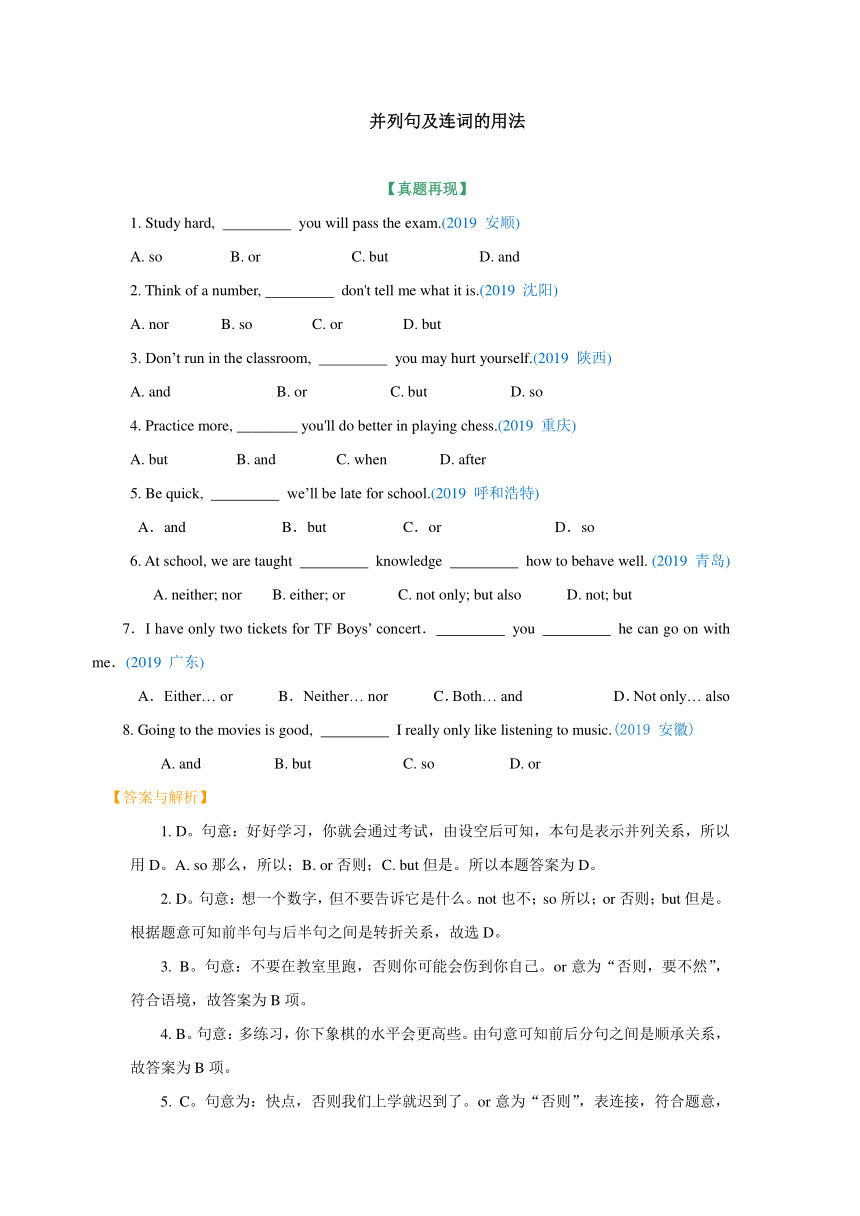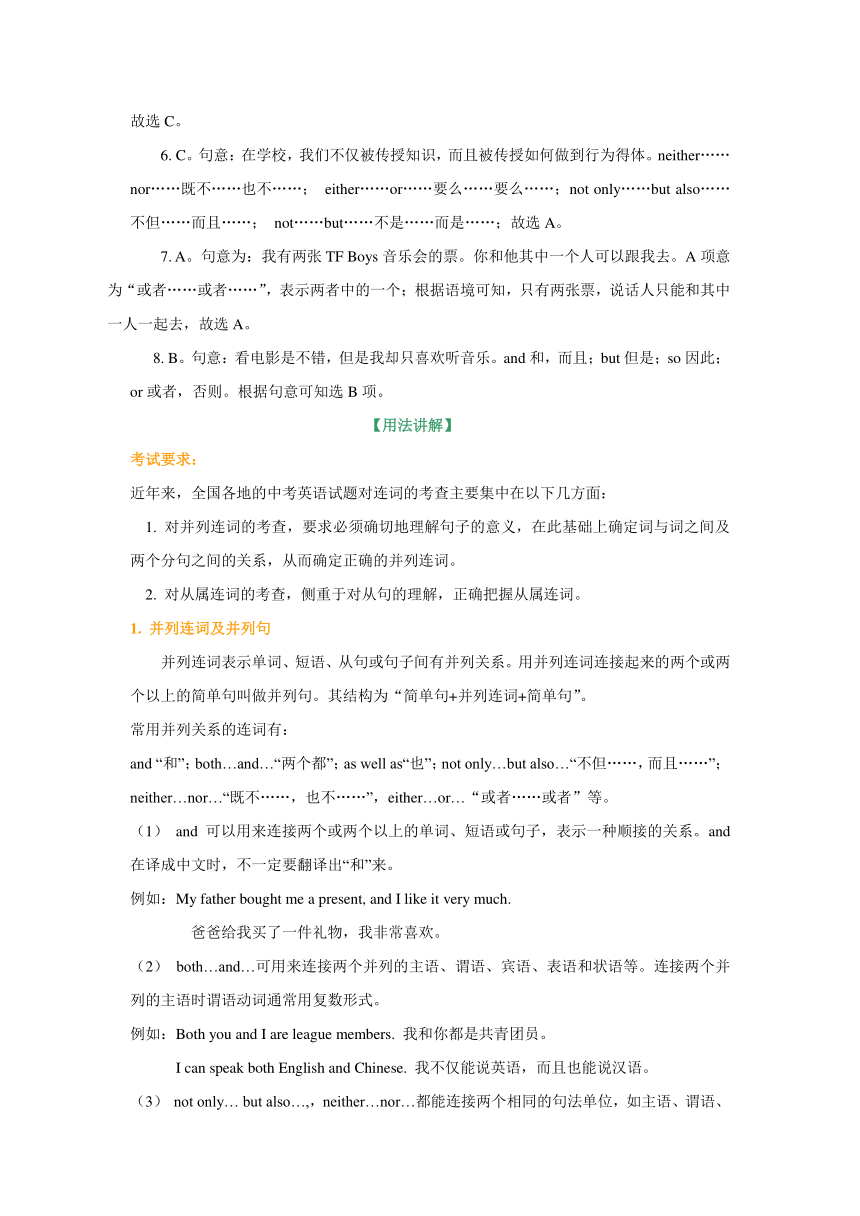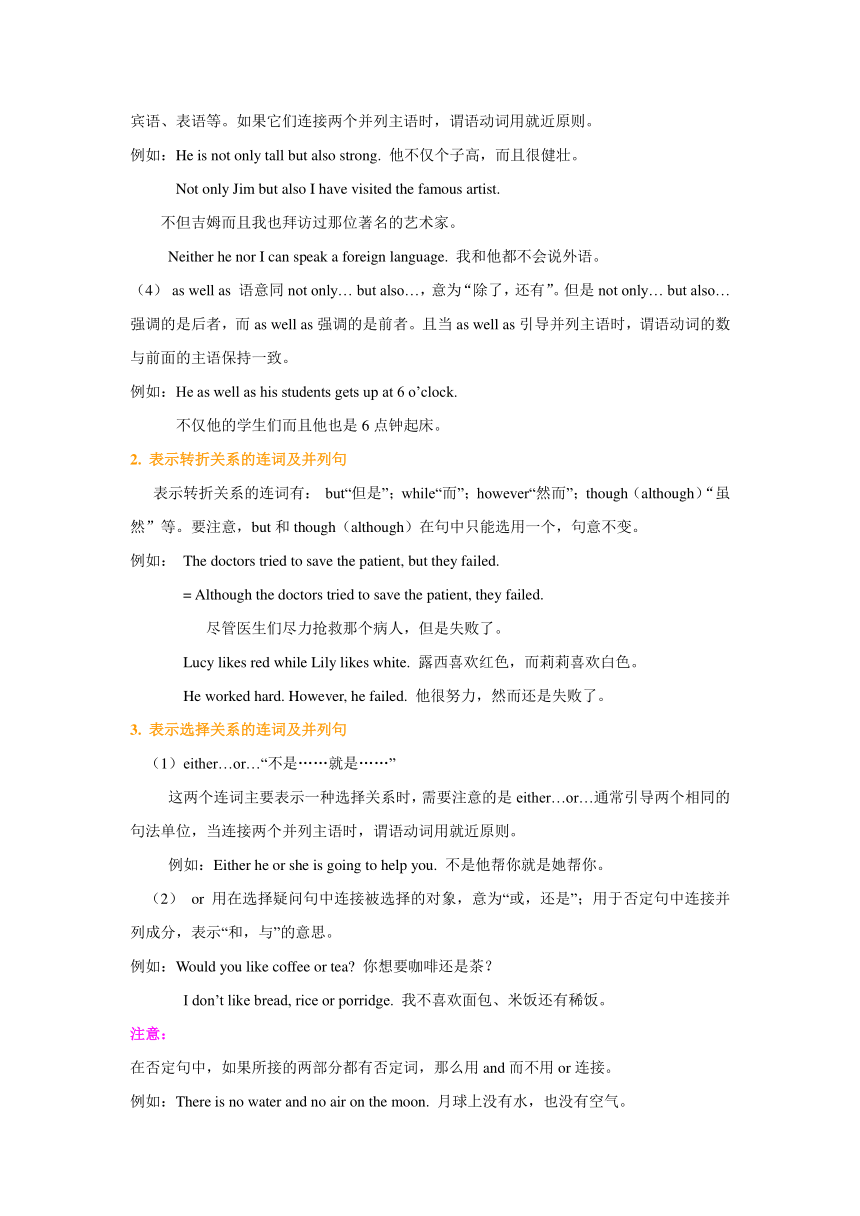2020年中考英语二轮专题复习:并列句及连词的用法
文档属性
| 名称 | 2020年中考英语二轮专题复习:并列句及连词的用法 |

|
|
| 格式 | zip | ||
| 文件大小 | 26.9KB | ||
| 资源类型 | 教案 | ||
| 版本资源 | |||
| 科目 | 英语 | ||
| 更新时间 | 2019-11-05 00:00:00 | ||
图片预览



文档简介
并列句及连词的用法
【真题再现】
1. Study hard, you will pass the exam.(2019 安顺)
A. so B. or C. but D. and
2.?Think?of?a?number,? don't?tell?me?what?it?is.(2019 沈阳)
A.?nor? B.?so? C.?or? D.?but
3. Don’t run in the classroom, you may hurt yourself.(2019 陕西)
A. and B. or C. but D. so
4. Practice more, ________ you'll do better in playing chess.(2019 重庆)
A. but B. and C. when D. after
5. Be quick, we’ll be late for school.(2019 呼和浩特)
A.and B.but C.or D.so
6. At school, we are taught knowledge how to behave well. (2019 青岛)
A. neither; nor B. either; or C. not only; but also D. not; but
7.I have only two tickets for TF Boys’ concert. you he can go on with me.(2019 广东)
A.Either… or B.Neither… nor C.Both… and D.Not only… also
8. Going to the movies is good, I really only like listening to music.(2019 安徽)
A. and B. but C. so D. or
【答案与解析】
1. D。句意:好好学习,你就会通过考试,由设空后可知,本句是表示并列关系,所以用D。A. so那么,所以;B. or否则;C. but但是。所以本题答案为D。
2. D。句意:想一个数字,但不要告诉它是什么。not也不;so所以;or否则;but但是。根据题意可知前半句与后半句之间是转折关系,故选D。
3. B。句意:不要在教室里跑,否则你可能会伤到你自己。or意为“否则,要不然”,符合语境,故答案为B项。
4. B。句意:多练习,你下象棋的水平会更高些。由句意可知前后分句之间是顺承关系,故答案为B项。
5. C。句意为:快点,否则我们上学就迟到了。or意为“否则”,表连接,符合题意,故选C。
6. C。句意:在学校,我们不仅被传授知识,而且被传授如何做到行为得体。neither……nor……既不……也不……; either……or……要么……要么……;not only……but also……不但……而且……; not……but……不是……而是……;故选A。
7. A。句意为:我有两张TF Boys音乐会的票。你和他其中一个人可以跟我去。A项意为“或者……或者……”,表示两者中的一个;根据语境可知,只有两张票,说话人只能和其中一人一起去,故选A。
8. B。句意:看电影是不错,但是我却只喜欢听音乐。and和,而且;but但是;so因此;or或者,否则。根据句意可知选B项。
【用法讲解】
考试要求:
近年来,全国各地的中考英语试题对连词的考查主要集中在以下几方面:
1. 对并列连词的考查,要求必须确切地理解句子的意义,在此基础上确定词与词之间及两个分句之间的关系,从而确定正确的并列连词。
2. 对从属连词的考查,侧重于对从句的理解,正确把握从属连词。
1. 并列连词及并列句
并列连词表示单词、短语、从句或句子间有并列关系。用并列连词连接起来的两个或两个以上的简单句叫做并列句。其结构为“简单句+并列连词+简单句”。
常用并列关系的连词有:
and “和”;both…and…“两个都”;as well as“也”;not only…but also…“不但……,而且……”;neither…nor…“既不……,也不……”,either…or…“或者……或者”等。
(1) and可以用来连接两个或两个以上的单词、短语或句子,表示一种顺接的关系。and在译成中文时,不一定要翻译出“和”来。
例如:My father bought me a present, and I like it very much.
爸爸给我买了一件礼物,我非常喜欢。
(2) both…and…可用来连接两个并列的主语、谓语、宾语、表语和状语等。连接两个并列的主语时谓语动词通常用复数形式。
例如:Both you and I are league members. 我和你都是共青团员。
I can speak both English and Chinese. 我不仅能说英语,而且也能说汉语。
(3) not only… but also…,,neither…nor…都能连接两个相同的句法单位,如主语、谓语、宾语、表语等。如果它们连接两个并列主语时,谓语动词用就近原则。
例如:He is not only tall but also strong. 他不仅个子高,而且很健壮。
Not only Jim but also I have visited the famous artist.
不但吉姆而且我也拜访过那位著名的艺术家。
Neither he nor I can speak a foreign language. 我和他都不会说外语。
(4) as well as 语意同not only… but also…,意为“除了,还有”。但是not only… but also…强调的是后者,而as well as强调的是前者。且当as well as引导并列主语时,谓语动词的数与前面的主语保持一致。
例如:He as well as his students gets up at 6 o’clock.
不仅他的学生们而且他也是6点钟起床。
2. 表示转折关系的连词及并列句
表示转折关系的连词有: but“但是”;while“而”;however“然而”;though(although)“虽然”等。要注意,but和though(although)在句中只能选用一个,句意不变。
例如: The doctors tried to save the patient, but they failed.
= Although the doctors tried to save the patient, they failed.
尽管医生们尽力抢救那个病人,但是失败了。
Lucy likes red while Lily likes white. 露西喜欢红色,而莉莉喜欢白色。
He worked hard. However, he failed. 他很努力,然而还是失败了。
3. 表示选择关系的连词及并列句
(1)either…or…“不是……就是……”
这两个连词主要表示一种选择关系时,需要注意的是either…or…通常引导两个相同的句法单位,当连接两个并列主语时,谓语动词用就近原则。
例如:Either he or she is going to help you. 不是他帮你就是她帮你。
(2) or 用在选择疑问句中连接被选择的对象,意为“或,还是”;用于否定句中连接并列成分,表示“和,与”的意思。
例如:Would you like coffee or tea? 你想要咖啡还是茶?
I don’t like bread, rice or porridge. 我不喜欢面包、米饭还有稀饭。
注意:
在否定句中,如果所接的两部分都有否定词,那么用and而不用or连接。
例如:There is no water and no air on the moon. 月球上没有水,也没有空气。
or在祈使句中意为“否则”,句型为:“祈使句,or …”=“If you don’t…,you’ll…”,or在这里表示“(请你干…)否则你就会…”,含有明显的转折意味。
Hurry up,or you will be late.
=If you don’t hurry up,you will be late. 快点,否则你会迟到的。
IV.表示因果关系的连词及并列句
表示因果关系的并列连词有so(所以),for(因为)。for可译为“因为”,但只是为主句中所说的话提供推断的理由加以解释,且for引导的句子往往放于主句之后,前面用逗号隔开。
Kate was ill, so she didn’t go to school. 凯特生病了,所以她没有去上学。
I have to stay up late, for I have lots of homework to do.
我不得不熬夜,因为我有许多作业要做。
并列句及连词的用法
【巩固练习】
I.单项选择。
1. Help others whenever you can you’ll make the world a nicer place to live.
A. and B. or C. unless D. but
2. These story books for children are awfully written. They are interesting exciting.
A. either, or B. neither, nor C. both, and D. not only, but also
3. —Would you like to go to the concert with me?
—I’d love to, I’m afraid I have no time.
A. so B. or C. and D. but
4. —Where was your brother at this time last night?
—He was writing an e-mail I was watching TV at home.
A. as soon as B. after C. until D. while
5. you your brother can join us. We want one of you.
A. Both, and B. Neither, nor C. Either, or D. Not only, but also
6. _______ the story is short and there are no new words in it, it is difficult to understand.
A. But B. Though C. And D. For
7. —Mom, shall we have supper now?
—Oh, we won’t have supper ______ your dad comes back.
A. until B. since C. while D. after
8. He won’t pass the exam ______he works hard.
A. whenever B. because C. if D. unless
9. Tony is a quiet student, he is active in class.
A. so B. and C. but D. or
10. They will lose the game they try their best,
A. unless B. once C. since D. after
11. You won’t feel happy at school _______ you get on well with your classmates.
A. though B. when C. unless D. because
12. This is my twin sister, Lucy. Not only she but also I _______ good at drawing.
A. is B. am C. are D. can
13. The restaurant is nice and the food is not bad. _______I still prefer eating at home.
A. And B. But C. So D. Or
14. Be quick, ___we’ll be late for school.
A. and B. or C. so D. but
15. The rain is very heavy________ we have to stay at home.
A. but B. because C. so D. and
16.—I don’t think your uncle really likes drama series.
—No, ________ he still watches the programme.
A.and B.so C.or D.but
17. You have coughed for several days, Bill. Stop smoking,________ you’ll get better soon.
A. but B. after C. or D. and
18. —_______Rose _______Jack watched Prince William’s wedding on TV yesterday.
— What a pity! They missed the exciting moment.
A. Both, and B. Not only; but also C. Either; or D. Neither, nor
19. The box was too heavy for me to carry, _______I pulled it into my room.
A. so B. and C. but D. or
20. I ______ believe it _______ I see it with my own eyes.
A. won’t; and B. will; but
C. will; until D. won’t; until
II.用适当的并列连词填空(and,but,so,for,or)。
1.Go along the street,_______ you'll find the shop.
2.The weather was very cold,_______ many people were ill.
3.People think we look the same,_______ I can see that we're different.
4.I know him _______ I can't remember his name.
5.You may go with him _______ stay at home alone.
6.Let's take the stone away,_______ there may be an accident.
7.The shop was quite new,_______ it had opened only the week before.
8.My glasses were broken,_______ I need a new pair.
【答案与解析】
I.单项选择。
1. A。由于前后句子表示顺接关系,所以选择and。句意为“无论什么时间你能帮助别人,你都能使世界更美好”。
2. B。句意为“这些书对于孩子们来说,写得太糟糕了,它们既不有趣,也不让人兴奋”。所以应该选B项,意为“既不……也不……”。
3. D。答语表示转折关系,所以选用but。句意为“我想去,但我担心没有时间”。
4. D。表示两个并列的动作同时进行,答语意为“他在写邮件,而我在看电视”。
5. C。 句意为“你或者你弟弟可以加入我们,我们想要你们其中一位”。前后句表示选择关系,所以选either…or,意为 “或者……或者”。
6.B。本题是考查引导词though的用法表示“虽然、尽管”的意思。注意选项D作连词连接并列句不能放在句首。
7. A。until用于否定句中,表示句子的动作直到until短语所表示的时间才开始发生,即表示动作的起点。While跟连续性的动词;since连接的句子主句一般用现在完成时,从句用过去时。
8. D。 根据句意“他将不会通过考试,除非他努力学习”。whenever无论何时,because因为,if如果,unless除非。故选D。
9. C。 考查but用法,quiet和active正好相反,用but表示意思的转折。
10. A。句意为“如果他们不努力,比赛就会失败。”unless意为“如果不”。故选A。
11. C。句意:你在学校不会感到快乐,除非与同学处得很好。unless意为“除非,如果不”。
12. B。Not only…but also…意为“不但……而且……”,连接主语时,谓语动词要就近,跟最近的主语一致。
13. B。由后句句意为“我仍喜欢在家里吃饭”及前句句意“餐馆虽然很好,菜也不错”可知两者为转折关系,用but。
14. B。 考查连词的用法。and“又、而”,表并列或承接;or “或者、否则”,表示选择或假设;so“因此”,表结果。根据句意“快点,否则我们上学会迟到”。这是“祈使句+or+陈述句”的结构,故选B。
15. C。but表示转折;because引导的状语从句表示造成结果的原因。so引导的状语从句表示原因产生的结果。句意为“雨下得很大,因此我们必须呆在家”。
16. D。句意为“——我认为你叔叔的确不喜欢看电视连续剧。——是的,但他仍然看这部剧”。本题考查连词的用法。由上下文的句意可知此处表示转折,故选but。
17. D。考查连词的用法。句意为“比尔,你咳嗽好几天。停止吸烟吧,你不久就会好”。结构为:祈使句+and+将来时。 故选D。
18. D。连词短语辨析。both…and两者都, not only…but also不但……而且……,either…or或者……或者,neither…nor(两者)既不……也不……。由答语可知二者都没看,故选择D。
19. A。从句意“对我来说这个箱子太重了,以至于拿不动,所以我把它推到我的房间里了”,前后句表示因果关系,故答案为A。
20. D。考查连词not…until的用法。句意为:“直到我亲眼看见这个事,我才会相信。”。not …until意为“直到…才”。故选D。
II.用适当的并列连词填空。
1.and 2.so 3.but 4.but 5.or 6.or 7.for 8.so
【真题再现】
1. Study hard, you will pass the exam.(2019 安顺)
A. so B. or C. but D. and
2.?Think?of?a?number,? don't?tell?me?what?it?is.(2019 沈阳)
A.?nor? B.?so? C.?or? D.?but
3. Don’t run in the classroom, you may hurt yourself.(2019 陕西)
A. and B. or C. but D. so
4. Practice more, ________ you'll do better in playing chess.(2019 重庆)
A. but B. and C. when D. after
5. Be quick, we’ll be late for school.(2019 呼和浩特)
A.and B.but C.or D.so
6. At school, we are taught knowledge how to behave well. (2019 青岛)
A. neither; nor B. either; or C. not only; but also D. not; but
7.I have only two tickets for TF Boys’ concert. you he can go on with me.(2019 广东)
A.Either… or B.Neither… nor C.Both… and D.Not only… also
8. Going to the movies is good, I really only like listening to music.(2019 安徽)
A. and B. but C. so D. or
【答案与解析】
1. D。句意:好好学习,你就会通过考试,由设空后可知,本句是表示并列关系,所以用D。A. so那么,所以;B. or否则;C. but但是。所以本题答案为D。
2. D。句意:想一个数字,但不要告诉它是什么。not也不;so所以;or否则;but但是。根据题意可知前半句与后半句之间是转折关系,故选D。
3. B。句意:不要在教室里跑,否则你可能会伤到你自己。or意为“否则,要不然”,符合语境,故答案为B项。
4. B。句意:多练习,你下象棋的水平会更高些。由句意可知前后分句之间是顺承关系,故答案为B项。
5. C。句意为:快点,否则我们上学就迟到了。or意为“否则”,表连接,符合题意,故选C。
6. C。句意:在学校,我们不仅被传授知识,而且被传授如何做到行为得体。neither……nor……既不……也不……; either……or……要么……要么……;not only……but also……不但……而且……; not……but……不是……而是……;故选A。
7. A。句意为:我有两张TF Boys音乐会的票。你和他其中一个人可以跟我去。A项意为“或者……或者……”,表示两者中的一个;根据语境可知,只有两张票,说话人只能和其中一人一起去,故选A。
8. B。句意:看电影是不错,但是我却只喜欢听音乐。and和,而且;but但是;so因此;or或者,否则。根据句意可知选B项。
【用法讲解】
考试要求:
近年来,全国各地的中考英语试题对连词的考查主要集中在以下几方面:
1. 对并列连词的考查,要求必须确切地理解句子的意义,在此基础上确定词与词之间及两个分句之间的关系,从而确定正确的并列连词。
2. 对从属连词的考查,侧重于对从句的理解,正确把握从属连词。
1. 并列连词及并列句
并列连词表示单词、短语、从句或句子间有并列关系。用并列连词连接起来的两个或两个以上的简单句叫做并列句。其结构为“简单句+并列连词+简单句”。
常用并列关系的连词有:
and “和”;both…and…“两个都”;as well as“也”;not only…but also…“不但……,而且……”;neither…nor…“既不……,也不……”,either…or…“或者……或者”等。
(1) and可以用来连接两个或两个以上的单词、短语或句子,表示一种顺接的关系。and在译成中文时,不一定要翻译出“和”来。
例如:My father bought me a present, and I like it very much.
爸爸给我买了一件礼物,我非常喜欢。
(2) both…and…可用来连接两个并列的主语、谓语、宾语、表语和状语等。连接两个并列的主语时谓语动词通常用复数形式。
例如:Both you and I are league members. 我和你都是共青团员。
I can speak both English and Chinese. 我不仅能说英语,而且也能说汉语。
(3) not only… but also…,,neither…nor…都能连接两个相同的句法单位,如主语、谓语、宾语、表语等。如果它们连接两个并列主语时,谓语动词用就近原则。
例如:He is not only tall but also strong. 他不仅个子高,而且很健壮。
Not only Jim but also I have visited the famous artist.
不但吉姆而且我也拜访过那位著名的艺术家。
Neither he nor I can speak a foreign language. 我和他都不会说外语。
(4) as well as 语意同not only… but also…,意为“除了,还有”。但是not only… but also…强调的是后者,而as well as强调的是前者。且当as well as引导并列主语时,谓语动词的数与前面的主语保持一致。
例如:He as well as his students gets up at 6 o’clock.
不仅他的学生们而且他也是6点钟起床。
2. 表示转折关系的连词及并列句
表示转折关系的连词有: but“但是”;while“而”;however“然而”;though(although)“虽然”等。要注意,but和though(although)在句中只能选用一个,句意不变。
例如: The doctors tried to save the patient, but they failed.
= Although the doctors tried to save the patient, they failed.
尽管医生们尽力抢救那个病人,但是失败了。
Lucy likes red while Lily likes white. 露西喜欢红色,而莉莉喜欢白色。
He worked hard. However, he failed. 他很努力,然而还是失败了。
3. 表示选择关系的连词及并列句
(1)either…or…“不是……就是……”
这两个连词主要表示一种选择关系时,需要注意的是either…or…通常引导两个相同的句法单位,当连接两个并列主语时,谓语动词用就近原则。
例如:Either he or she is going to help you. 不是他帮你就是她帮你。
(2) or 用在选择疑问句中连接被选择的对象,意为“或,还是”;用于否定句中连接并列成分,表示“和,与”的意思。
例如:Would you like coffee or tea? 你想要咖啡还是茶?
I don’t like bread, rice or porridge. 我不喜欢面包、米饭还有稀饭。
注意:
在否定句中,如果所接的两部分都有否定词,那么用and而不用or连接。
例如:There is no water and no air on the moon. 月球上没有水,也没有空气。
or在祈使句中意为“否则”,句型为:“祈使句,or …”=“If you don’t…,you’ll…”,or在这里表示“(请你干…)否则你就会…”,含有明显的转折意味。
Hurry up,or you will be late.
=If you don’t hurry up,you will be late. 快点,否则你会迟到的。
IV.表示因果关系的连词及并列句
表示因果关系的并列连词有so(所以),for(因为)。for可译为“因为”,但只是为主句中所说的话提供推断的理由加以解释,且for引导的句子往往放于主句之后,前面用逗号隔开。
Kate was ill, so she didn’t go to school. 凯特生病了,所以她没有去上学。
I have to stay up late, for I have lots of homework to do.
我不得不熬夜,因为我有许多作业要做。
并列句及连词的用法
【巩固练习】
I.单项选择。
1. Help others whenever you can you’ll make the world a nicer place to live.
A. and B. or C. unless D. but
2. These story books for children are awfully written. They are interesting exciting.
A. either, or B. neither, nor C. both, and D. not only, but also
3. —Would you like to go to the concert with me?
—I’d love to, I’m afraid I have no time.
A. so B. or C. and D. but
4. —Where was your brother at this time last night?
—He was writing an e-mail I was watching TV at home.
A. as soon as B. after C. until D. while
5. you your brother can join us. We want one of you.
A. Both, and B. Neither, nor C. Either, or D. Not only, but also
6. _______ the story is short and there are no new words in it, it is difficult to understand.
A. But B. Though C. And D. For
7. —Mom, shall we have supper now?
—Oh, we won’t have supper ______ your dad comes back.
A. until B. since C. while D. after
8. He won’t pass the exam ______he works hard.
A. whenever B. because C. if D. unless
9. Tony is a quiet student, he is active in class.
A. so B. and C. but D. or
10. They will lose the game they try their best,
A. unless B. once C. since D. after
11. You won’t feel happy at school _______ you get on well with your classmates.
A. though B. when C. unless D. because
12. This is my twin sister, Lucy. Not only she but also I _______ good at drawing.
A. is B. am C. are D. can
13. The restaurant is nice and the food is not bad. _______I still prefer eating at home.
A. And B. But C. So D. Or
14. Be quick, ___we’ll be late for school.
A. and B. or C. so D. but
15. The rain is very heavy________ we have to stay at home.
A. but B. because C. so D. and
16.—I don’t think your uncle really likes drama series.
—No, ________ he still watches the programme.
A.and B.so C.or D.but
17. You have coughed for several days, Bill. Stop smoking,________ you’ll get better soon.
A. but B. after C. or D. and
18. —_______Rose _______Jack watched Prince William’s wedding on TV yesterday.
— What a pity! They missed the exciting moment.
A. Both, and B. Not only; but also C. Either; or D. Neither, nor
19. The box was too heavy for me to carry, _______I pulled it into my room.
A. so B. and C. but D. or
20. I ______ believe it _______ I see it with my own eyes.
A. won’t; and B. will; but
C. will; until D. won’t; until
II.用适当的并列连词填空(and,but,so,for,or)。
1.Go along the street,_______ you'll find the shop.
2.The weather was very cold,_______ many people were ill.
3.People think we look the same,_______ I can see that we're different.
4.I know him _______ I can't remember his name.
5.You may go with him _______ stay at home alone.
6.Let's take the stone away,_______ there may be an accident.
7.The shop was quite new,_______ it had opened only the week before.
8.My glasses were broken,_______ I need a new pair.
【答案与解析】
I.单项选择。
1. A。由于前后句子表示顺接关系,所以选择and。句意为“无论什么时间你能帮助别人,你都能使世界更美好”。
2. B。句意为“这些书对于孩子们来说,写得太糟糕了,它们既不有趣,也不让人兴奋”。所以应该选B项,意为“既不……也不……”。
3. D。答语表示转折关系,所以选用but。句意为“我想去,但我担心没有时间”。
4. D。表示两个并列的动作同时进行,答语意为“他在写邮件,而我在看电视”。
5. C。 句意为“你或者你弟弟可以加入我们,我们想要你们其中一位”。前后句表示选择关系,所以选either…or,意为 “或者……或者”。
6.B。本题是考查引导词though的用法表示“虽然、尽管”的意思。注意选项D作连词连接并列句不能放在句首。
7. A。until用于否定句中,表示句子的动作直到until短语所表示的时间才开始发生,即表示动作的起点。While跟连续性的动词;since连接的句子主句一般用现在完成时,从句用过去时。
8. D。 根据句意“他将不会通过考试,除非他努力学习”。whenever无论何时,because因为,if如果,unless除非。故选D。
9. C。 考查but用法,quiet和active正好相反,用but表示意思的转折。
10. A。句意为“如果他们不努力,比赛就会失败。”unless意为“如果不”。故选A。
11. C。句意:你在学校不会感到快乐,除非与同学处得很好。unless意为“除非,如果不”。
12. B。Not only…but also…意为“不但……而且……”,连接主语时,谓语动词要就近,跟最近的主语一致。
13. B。由后句句意为“我仍喜欢在家里吃饭”及前句句意“餐馆虽然很好,菜也不错”可知两者为转折关系,用but。
14. B。 考查连词的用法。and“又、而”,表并列或承接;or “或者、否则”,表示选择或假设;so“因此”,表结果。根据句意“快点,否则我们上学会迟到”。这是“祈使句+or+陈述句”的结构,故选B。
15. C。but表示转折;because引导的状语从句表示造成结果的原因。so引导的状语从句表示原因产生的结果。句意为“雨下得很大,因此我们必须呆在家”。
16. D。句意为“——我认为你叔叔的确不喜欢看电视连续剧。——是的,但他仍然看这部剧”。本题考查连词的用法。由上下文的句意可知此处表示转折,故选but。
17. D。考查连词的用法。句意为“比尔,你咳嗽好几天。停止吸烟吧,你不久就会好”。结构为:祈使句+and+将来时。 故选D。
18. D。连词短语辨析。both…and两者都, not only…but also不但……而且……,either…or或者……或者,neither…nor(两者)既不……也不……。由答语可知二者都没看,故选择D。
19. A。从句意“对我来说这个箱子太重了,以至于拿不动,所以我把它推到我的房间里了”,前后句表示因果关系,故答案为A。
20. D。考查连词not…until的用法。句意为:“直到我亲眼看见这个事,我才会相信。”。not …until意为“直到…才”。故选D。
II.用适当的并列连词填空。
1.and 2.so 3.but 4.but 5.or 6.or 7.for 8.so
同课章节目录
- 词法
- 名词
- 动词和动词短语
- 动词语态
- 动词时态
- 助动词和情态动词
- 非谓语动词
- 冠词
- 代词
- 数词和量词
- 形容词副词及其比较等级
- 介词和介词短语
- 连词和感叹词
- 构词法
- 相似、相近词比较
- 句法
- 陈述句
- 一般疑问句和否定疑问句
- 特殊疑问句及选择疑问句
- 反意疑问句
- 存在句(There be句型)
- 宾语从句
- 定语从句
- 状语从句
- 主谓一致问题
- 简单句
- 并列句
- 复合句
- 主谓一致
- 主、表语从句
- 名词性从句
- 直接引语和间接引语
- 虚拟语气
- 感叹句
- 强调句
- 倒装句
- 祈使句
- 句子的成分
- 句子的分类
- 题型专区
- 单项选择部分
- 易错题
- 完形填空
- 阅读理解
- 词汇练习
- 听说训练
- 句型转换
- 补全对话
- 短文改错
- 翻译
- 书面表达
- 任务型阅读
- 语法填空
- 其他资料
